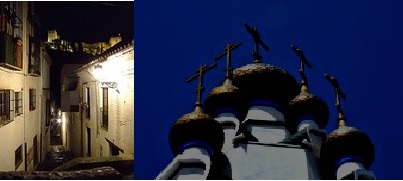Globe trotter Richard Halliburton enjoyed unique Christmas Eves during his many world trips but few provided the contrasts he encountered as those of 1921 and 1922 prior to his first book, “The Royal Road to Romance.” The differences in his mental state between the two occasions might have been because of the stark differences in climate or, on the other hand, might be a reflection of how his outlook had changed due to his year’s encounters with reality.
Quotes from my book, “A Shooting Star Meets the Well of Death, Why and How Richard Halliburton Conquered the World,” show the changes from lyrical to somber between the 1921 and 1922 events. As I recounted in my book, the former was leisurely and lyrical.
“He even spent a good part of Christmas Eve alone at the Alhambra wandering among the old battlements while he wistfully communed with the spirits of dead Moors. While doing so he was amazed there were no others paying homage along with him on that chilly night.
“He was always surprised that something of extraordinary beauty, a song, a statue, a building like the Alhambra could stir his emotions so much. It could have been, of course, that it was a case of classic symmetry that called out to him, commanding his admiration. Alternately, he wondered whether he was so moved by this structure because of the warm memories generated by stories of fabled castles told him by his parents and Ammudder when he was a boy or was it because he had been educated to appreciate beautiful things? He wondered how a caveman, uneducated and never exposed to such beautiful symmetry would have reacted if he had wandered out of the brush and suddenly laid eyes on such an architectural masterpiece. Would he be as deeply moved or would he just stare dumbly at the masterpiece then move on because he had no standard to compare it to?
“He pondered this and his inner contentment as he walked, then decided he was becoming too philosophical. The remainder of the night he passed with live Christians, celebrating Yuletide mass in the huge cathedral, it too a former Moorish structure.”
Conversely, Halliburton’s 1922 Yuletide experience came while engulfed in frigid temperatures and not so romantic or inspiring an environment as he struggled among the teeming masses of people displaced by the Russian revolution. As set forth in my book;
“He spent his second Christmas Eve away from home in the frozen port of Harbin, enduring the piteous crush of Russian Orthodox refugees at Holy Mass. From Harbin he shivered on the train to Vladivostok where he passed a somber several days observing a dismal mix of Cossacks, more Russian refugees, and ardent Bolsheviks balefully regarding each other. Appropriately enough, his brief visit to Russia ended in a New Year’s blizzard. “
His spirits and outlook would soon revert to his usually upbeat mood as his ship neared Japan where he would become the first person to climb Fuji alone in the winter time.
William R. Taylor www.rhalliburtonstar.com

 RSS Feed
RSS Feed